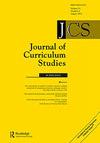School principals as translators – examining Swedish school principals’ translations of the standards-based curriculum
IF 2
3区 教育学
Q1 EDUCATION & EDUCATIONAL RESEARCH
引用次数: 0
Abstract
ABSTRACT This study takes the policy idea of the standards-based curriculum as a point of departure. Drawing on discursive institutionalism and pragmatic institutionalism, the study’s purpose is to critically examine school principals empirically as translators, enacting Sweden’s standards-based curriculum into local schools’ practices. The data were collected through interviews with principals from four compulsory schools in different geographical regions of Sweden, selected through purposive sampling. Røvik’s ‘translator competence’ framework and Schmidt’s ‘sentient agents’ framework were used as analytical tools. In the empirical material, examples of school principals as knowledgeable, creative, patient and strong translators were identified, interpreted as their ‘background ideational abilities’. Discourses on ‘foreground ideational abilities’ also were identified in the principals’ experiences as translators through their critical and deliberative reflections on the standards-based curriculum. By integrating discursive institutionalism and pragmatic institutionalism into the study, ideas and discourse, as well as agency and contextual and normative experiences, were interpreted as important aspects of policy translation. This provided opportunities for a broader understanding of school principals’ translations of the standards-based curriculum, which hopefully also can help develop the theoretical and methodological discursive institutional approach within education research.作为翻译的学校校长——考察瑞典学校校长对标准课程的翻译
本研究以标准课程的政策理念为出发点。利用话语制度主义和实用主义制度主义,本研究的目的是批判性地考察学校校长作为翻译的经验,将瑞典的标准课程纳入当地学校的实践。数据是通过对瑞典不同地理区域的四所义务教育学校校长的访谈收集的,通过有目的的抽样选择。Røvik的“译者能力”框架和Schmidt的“感知主体”框架被用作分析工具。在实证材料中,学校校长知识渊博、有创造力、有耐心、翻译能力强的例子被确定,并被解释为他们的“背景概念能力”。在校长作为翻译的经历中,通过他们对基于标准的课程的批判性和深思熟虑的反思,也发现了关于“前景概念能力”的话语。通过将话语制度主义和语用制度主义整合到研究中,思想和话语以及代理和上下文和规范经验被解释为政策翻译的重要方面。这为更广泛地理解学校校长对基于标准的课程的翻译提供了机会,这也有望有助于在教育研究中发展理论和方法上的话语制度方法。
本文章由计算机程序翻译,如有差异,请以英文原文为准。
求助全文
约1分钟内获得全文
求助全文
来源期刊

Journal of Curriculum Studies
EDUCATION & EDUCATIONAL RESEARCH-
CiteScore
4.70
自引率
4.80%
发文量
19
审稿时长
24 weeks
期刊介绍:
Journal of Curriculum Studies publishes conceptually rich contributions to all areas of curriculum studies, including those derived from empirical, philosophical, sociological, or policy-related investigations. The journal welcomes innovative papers that analyse the ways in which the social and institutional conditions of education and schooling contribute to shaping curriculum, including political, social and cultural studies; education policy; school reform and leadership; teaching; teacher education; curriculum development; and assessment and accountability. Journal of Curriculum Studies does not subscribe to any particular methodology or theory. As the prime international source for curriculum research, the journal publishes papers accessible to all the national, cultural, and discipline-defined communities that form the readership.
 求助内容:
求助内容: 应助结果提醒方式:
应助结果提醒方式:


